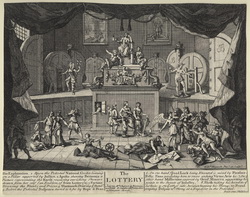The history of the lottery from inception to present-day

The history of the lottery
Lottery games came a long way and since they first emerged more than 2000 years ago, but they changed into the form that players from all over the world enjoy now. Supported or banned by the governments, the games endured and the authorities eventually accepted the fact that the lottery is here to stay. Instead of trying to ban it, they chose to turn it into a source of finding government projects and some even regard lottery games as a hidden way of taxation.
The evolution of the lottery over centuries
It is said that the first lotteries were organized in China during the Han Dynasty, although the games themselves were more similar to nowadays Keno. Where the system was more primitive and the prizes were awarded in a different manner, the goal was pretty much the same and the main beneficiaries were the ones organizing the game. The first lotteries occurred in Ancient Greece although the first time tickets when they were sold in large numbers and games were organized professionally was doing Augustus Caesar’s reign.
Public lotteries were not organized until the 15th century, with the town of Sluis in what is today the Netherlands, being the first place where lottery games were held. The prizes started to be significant, and the authorities regarded lottery games as a more elegant way of taxing people, since players voluntarily joined. One century later, the British embraced the lottery and the first major draw to place in 1569 with all of the money collected over the course of three years being shared by players.
Modern and contemporary lotteries
The Americans were equally keen on embracing lottery games, and after the first ones were held in the city of Jamestown, over 200 lotteries were created nationwide. Once again, the government used the opportunity to fund various projects with a part of the money collected from selling lottery tickets, and even supported the war effort. In the late 19th century, the growing corruption and mismanagement of the lotteries cause the Congress to pass legislation against it, and by the end of the century all the games were banned.
Lottery games reemerged in full force after the end of World War II, and since then were on the constant expansion. Nowadays, American lotteries such as the Powerball or Mega Millions are offering some of the largest jackpots in the world and hold the record in various categories. In other countries, the lottery gained just as much traction and names such as EuroMillions, El Gordo or El Nino are quite popular. The governments are no longer trying to ban the games but focus on regulating them and by using the instrument of taxation intelligently, they succeed in funding different projects with the money collected.
More about the history of the lottery.
Back to the Lottery page.